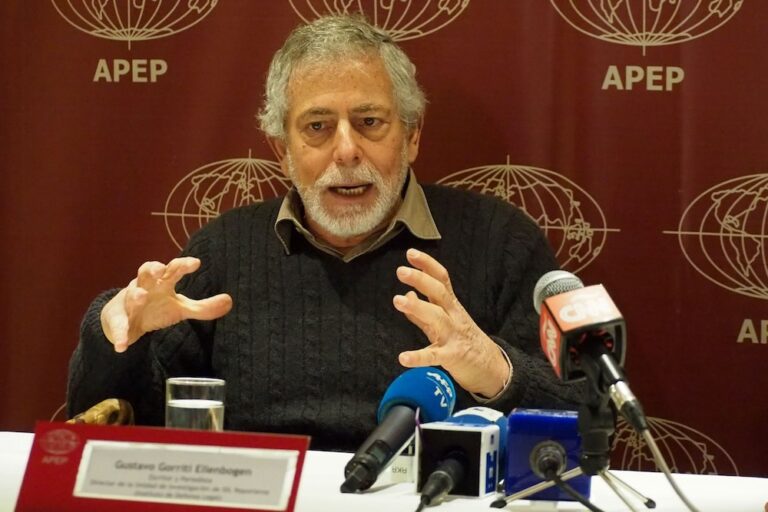(IPYS/IFEX) – On 11 February 1999 Ombudsman Jorge Santistevan de Noriega, made public his final report on the Isaac García Villanueva, of Tarapoto, case, entitled: “Freedom of expression in an electoral context.” During the 1998 electoral campaign, García recorded a political speech made by the then Minister of the Presidency, Tomás Gonzáles Reátegui, who was […]
(IPYS/IFEX) – On 11 February 1999 Ombudsman Jorge Santistevan de
Noriega, made public his final report on the Isaac García Villanueva, of
Tarapoto, case, entitled: “Freedom of expression in an electoral
context.” During the 1998 electoral campaign, García recorded a
political speech made by the then Minister of the Presidency, Tomás
Gonzáles Reátegui, who was openly urging the public to vote for the
official state candidate, Rolando Reátegui, for the post of mayor of
Tarapoto. García denounced this act to the Congress Finance Committee.
Soon afterwards García began to be subjected to pressure, and was
eventually obligated to travel to Lima and refute his stated accusations
despite the existence of the cassette that had been used in the
recording.
** Updates IFEX alerts of 19 October and 30 September 1998**
In putting together his report, the Ombudsman sent delegates to the city
of Tarapoto to carry out numerous interviews with the persons concerned
in the matter.
The Ombudsman’s report signals that journalist García “had no incentive
or interest in falsifying information in accusing the then Minister of
the Presidency of having subjected him to pressure”; that “the acts
denounced appear to be certain”; that there is “coherence and
consistency in García’s accusations”; that “unquestionably García was
present in the rally of 18 August” where he recorded the Minister’s
intervention; that the accused parties made “evasive excuses”; that all
those interviewed were aware that the acts being denounced were indeed
facts; that there is sufficient evidence to conclude that there were
persons connected to the Minister that
had an interest in ensuring that the recording was not distributed; and
that García, in spite of having retracted his denouncement and having
publicly apologized, continued fearing for his personal safety.
Amongst its conclusions, the report highlights that “it has been
possible to verify the call, put out by the ex Minister Gonzáles to the
citizens of Tarapoto, in support of the candidacy of Rolando Reátegui
Flores as mayor of the provincial municipality of San Martín. This call
for support was made in the rally held the night of 18 August 1998 in
the city of Tarapoto. Similarly, the ex Minister has been credited with
calling for support of the candidacy of William Guerra Valera as mayor
of the provincial Municipality of El Dorado, in the San José de Sisa
community. Both candidates belonged to the organization “Let’s go
neighbours”, (“Vamos Vecinos”), considered by a
significant sector of the communication media, to be closely connected
to the governing party.” The report also states that “the National
Elections Jury should pay close attention to this type of situations”;
that “from the non jurisdictional investigation that was carried out,
there is sufficient evidence to suggest that Gonzáles was instrumental
in ensuring that García was pressured to erase the cassette on which he
had recorded the then Minister’s words. This act is an affectation
against the freedom of expression, given that García was subject to
duress, with the aim to impede him from distributing journalistic
information”. In addition, the report states that “the conflictive
political context within which these events occurred, has been the cause
of a hostile attitude against García, on behalf of a large percentage of
the local press that actively participated in the
electoral process. This also explains why the Tarapoto journalists’
guild did not institutionally affirm their support for García.”
Finally, in a move of great significance, the Ombudsman resolved to send
his report to the Presidency of the Congress, to the Finance Committee
and the Congress Permanent Committee, to the President of the Ministers’
Council and the National Elections Jury, in as such as they act in
accordance with the Constitution and the legal system. This is an
attempt by the Ombudsman to collaborate with the ongoing investigation
of ex Minister Gonzáles’ conduct, which is currently in the process of
being submitted to various judicial processes.


